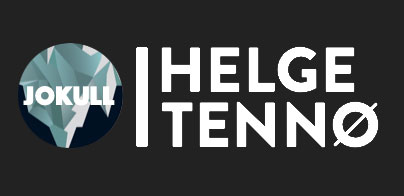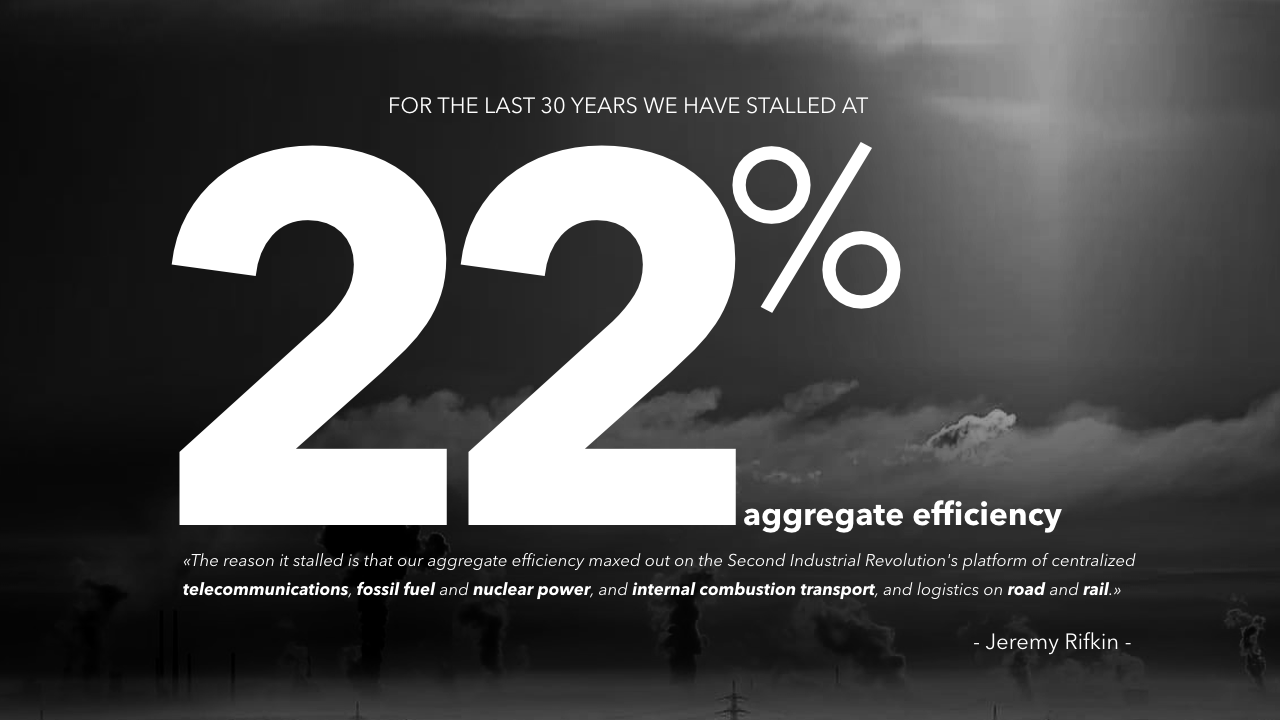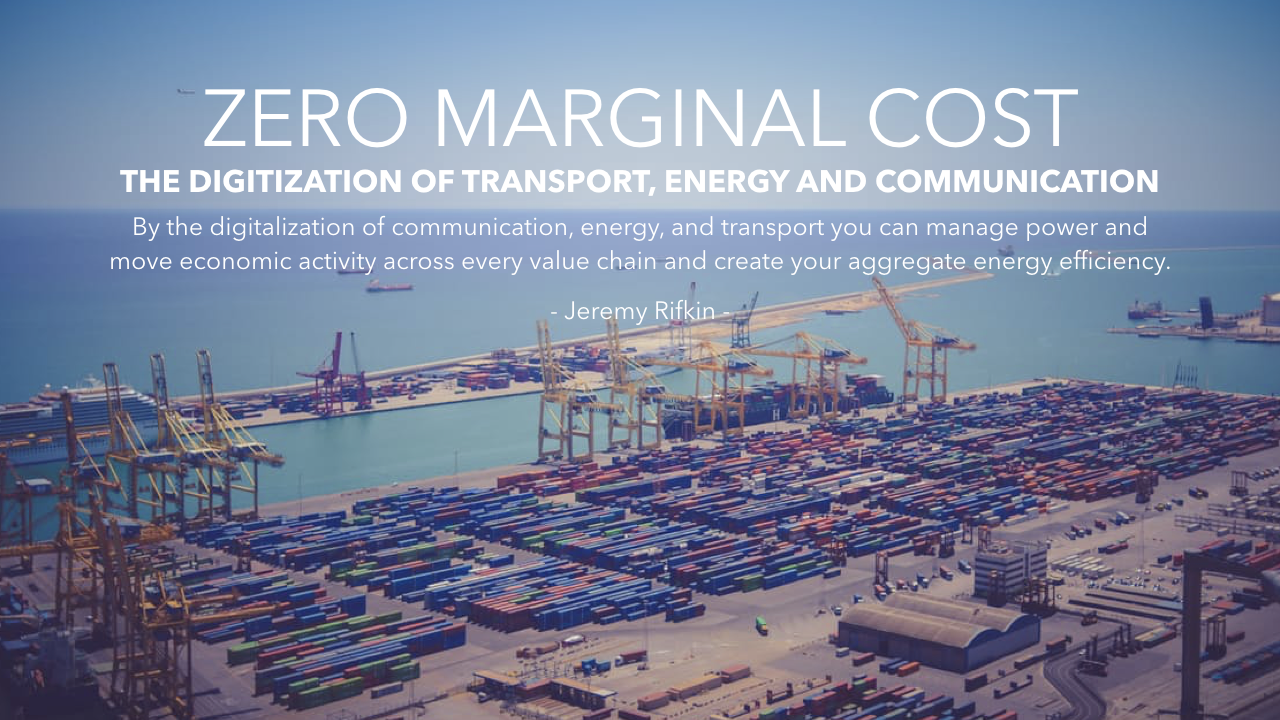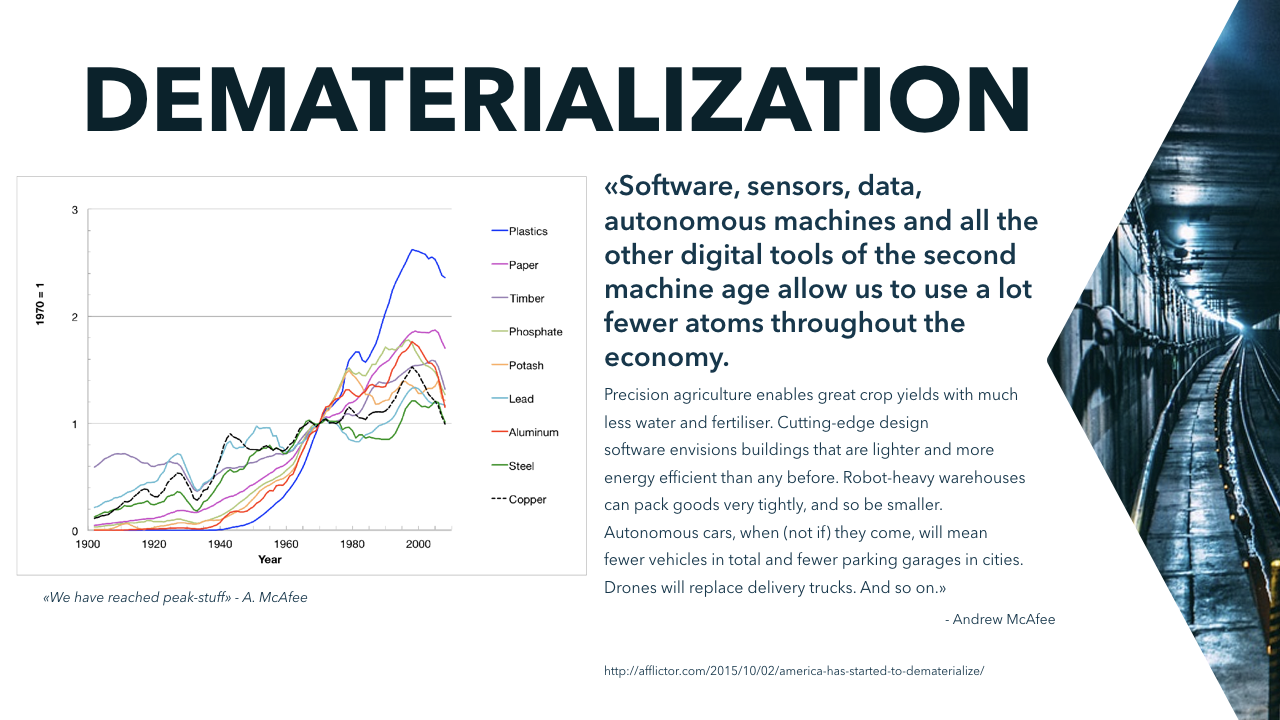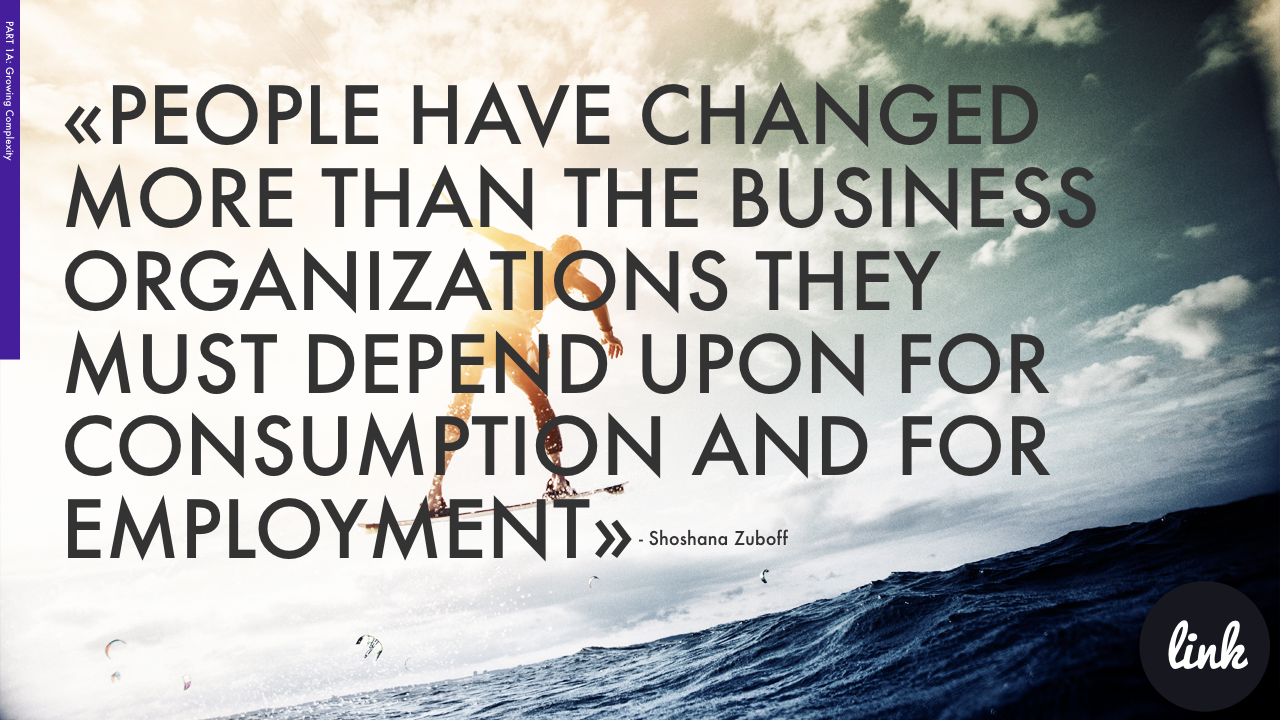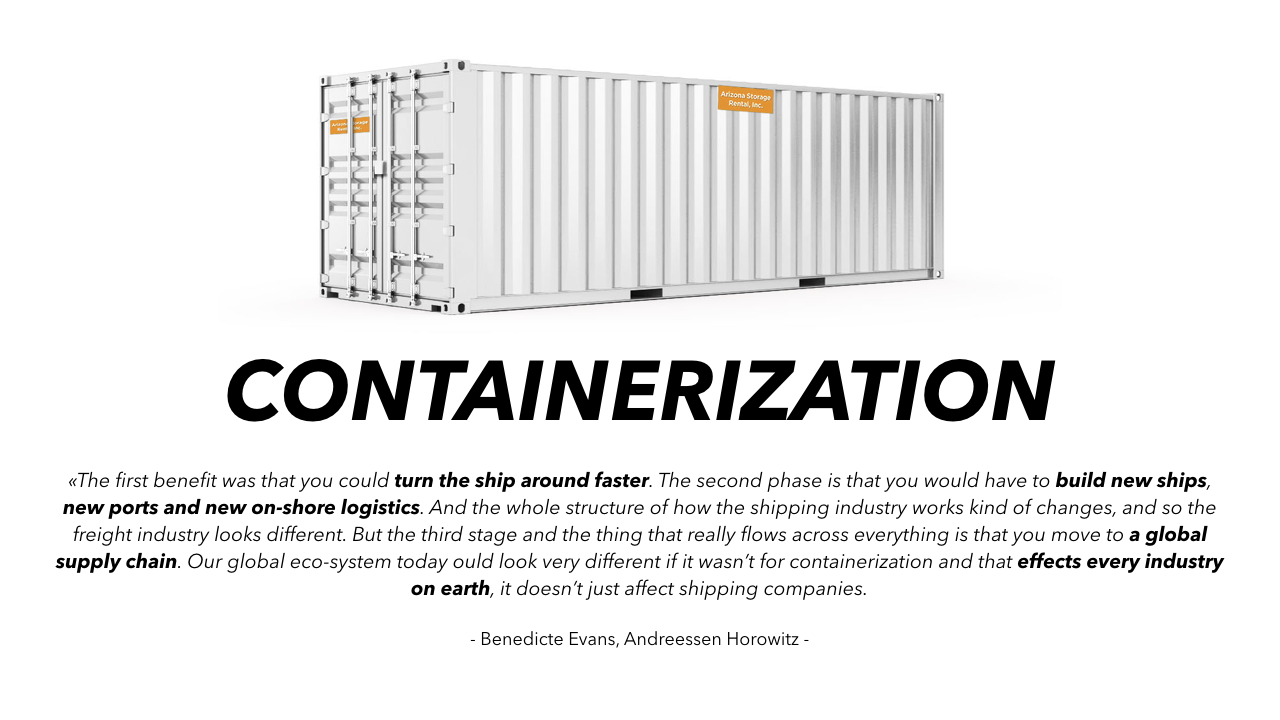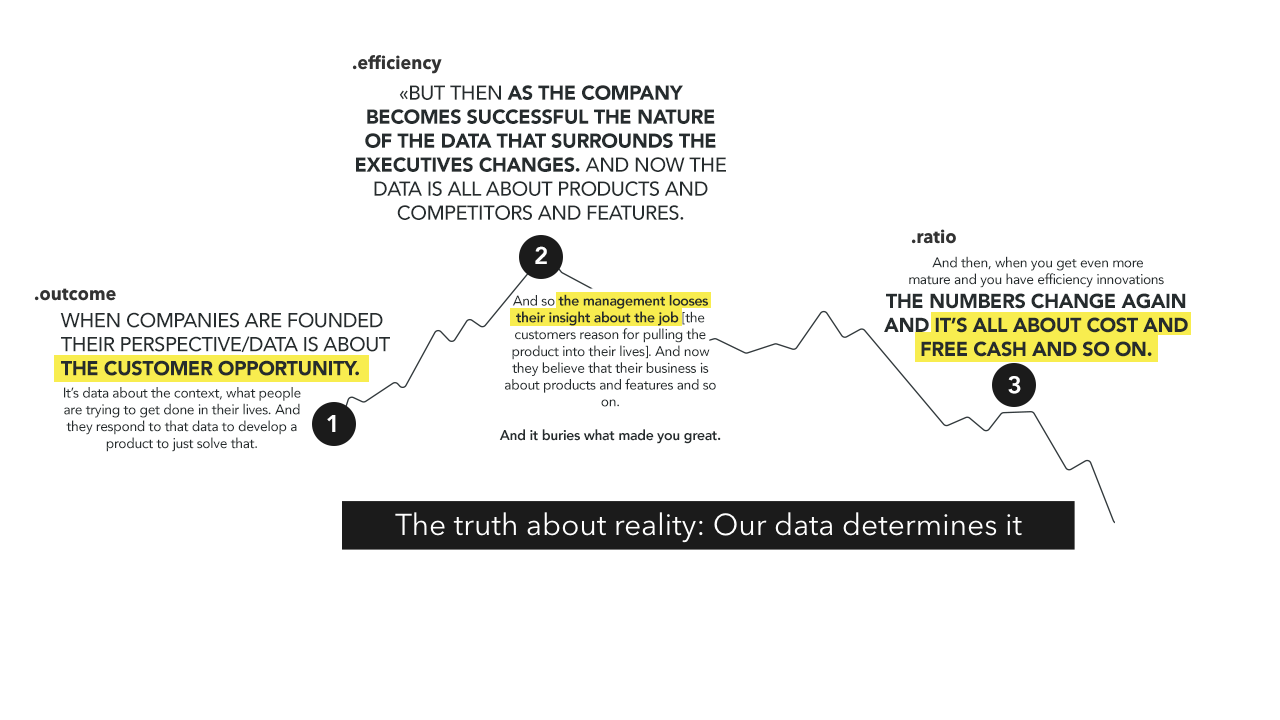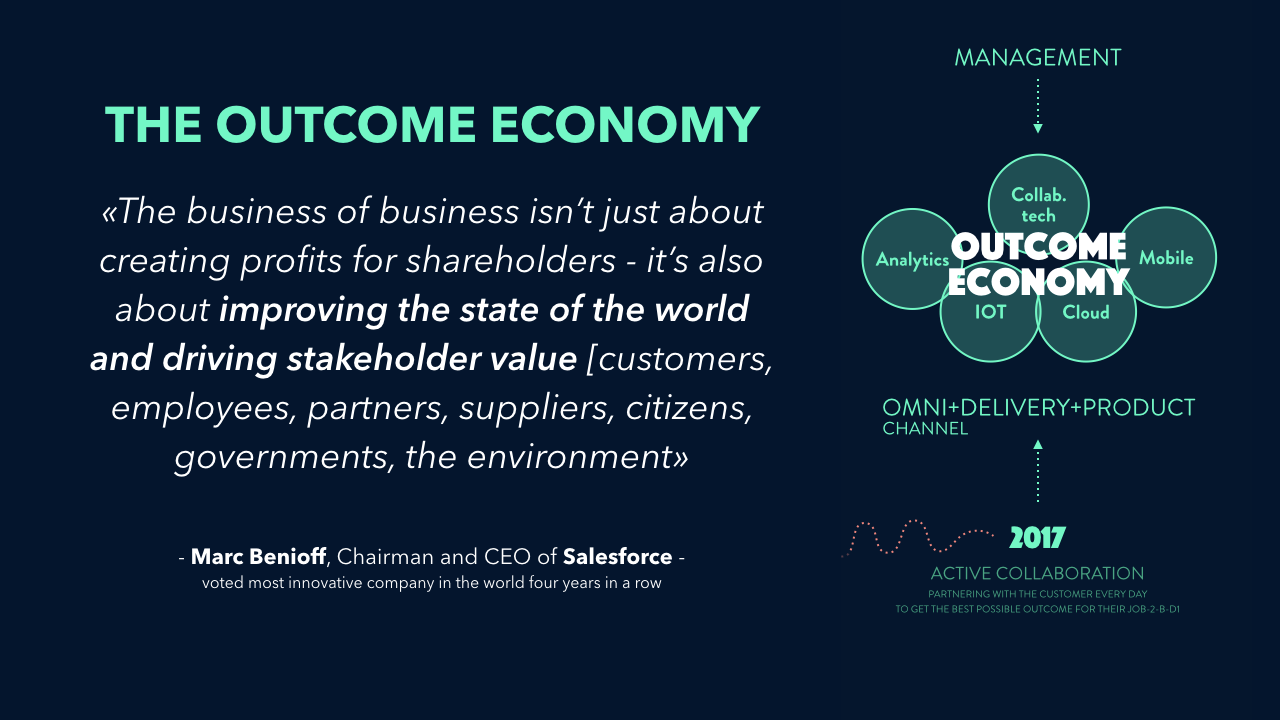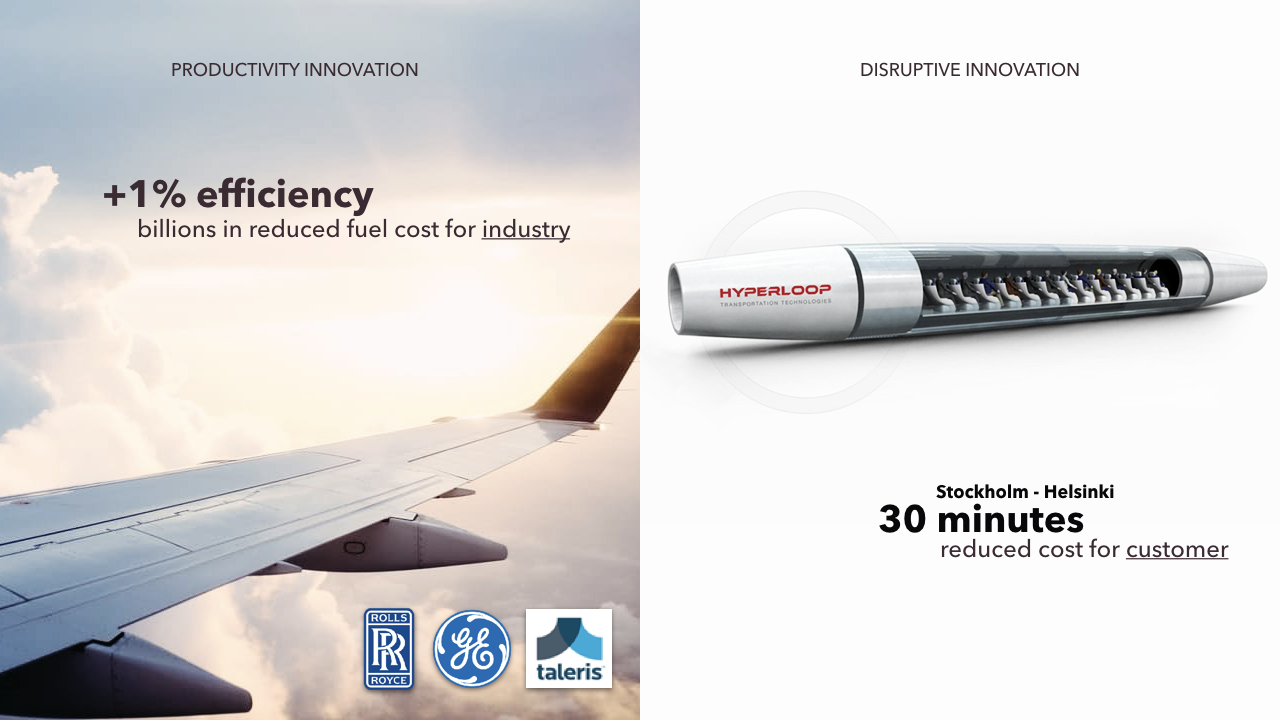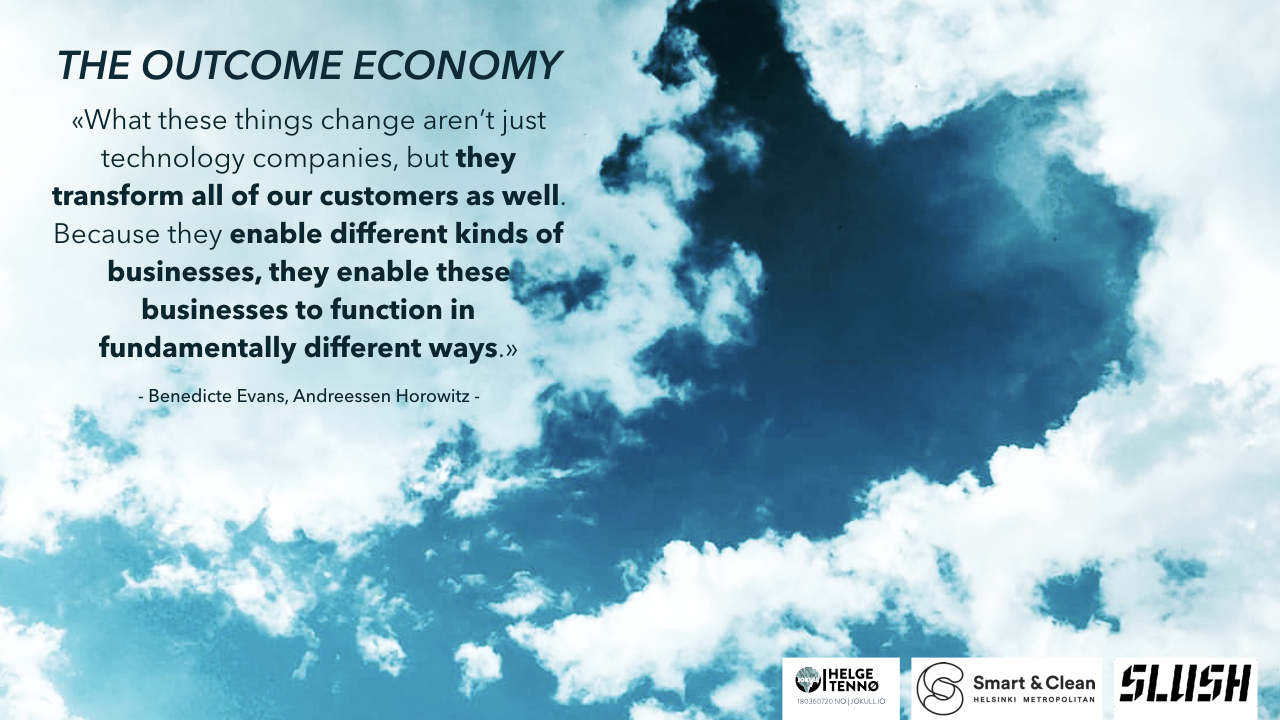Each technological age has been marked by a shift in how its industrial platform enables companies to rethink their business processes and create wealth (1). As we are standing on the brink of a new chapter of capitalism are we limiting our ability to rethink due to how we read, measure and perceive the world – how we cherry pick our data?
By limiting our data to what can be easily measured, the digital industrial age (industry 4.0), once such a promising new chapter, has been reduced to nothing more than an efficiency gain to the extractive business processes of the 20th century (2).
This needs to change!
This article is from my talk at the Smart & Clean Helsinki Metropolitan side event at this years SLUSH Festival in Helsinki.
– The dark secret
The world is keeping a secret from us – our aggregate efficiency. It is the amount of energy coming out of a process compared to how much is going in. And the secret is that this number has been stuck at 13% (US) for the last 30 years (in Japan it’s at 22%) (3). So, no matter how much innovation and effort we put into the system we are still burning this planet’s resources by a measure of 87 to 78 percent for every process we perform in production and distribution.
To be clear: our current technological platform, even at maximum efficiency, hasn’t got the capacity to decrease the burn rate on our planet.
– The solution is zero marginal cost
The industrial platform providing every technological age comprises of energy, transportation and communication. If we «Internetificate» these three, as suggested by Jeremy Rifkin (3), through digital communication, autonomous transportation and renewable energy, we will be able to create a new platform that can lift our aggregate efficiency to new heights with the goal of reaching zero marginal cost (when the production of a thousand or a million units has almost no additional cost to producing one unit).
– Imagination is our most valuable asset
Building this new platform is a massive undertaking and it demands more from us than just imagining a slightly more efficient future.
– Dematerialization
Companies love the idea of efficiency and standardization. It makes the world predictable and seemingly controllable. And with the right type of efficiency improvement we can make the world marginally better.
As Andrew McAfee points out through his concept of dematerialization (4); because of technology the world has reached and has already passed peak stuff:
«Software, sensors, data, autonomous machines and all the other digital tools of the second machine age allow us to use a lot fewer atoms throughout the economy.» – Andrew McAfee
We are spending less resources producing the same output because technology has made us smarter and leaner. The world is already becoming better and we didn’t have to make any sacrifices… What a wonderful world this could be.
But efficiency is just the first stage of entering a new technological age – and we have to make sure we’re not stuck for too long on its unimaginative future as our customers and employees have already left it (1) .
According to Shoshana Zuboff “The reigning model of of capitalism periodically goes into decline in those periods when people are changing faster than organizations(1).” with the slow societal change of the last decades combined with our current exponential growth in technology we are at such a time right now – people are demanding new things from companies that aren’t able to keep up.(1)
There is a far more valuable concept than dematerialization to keep our eye on when working to understand our imminent future.
– Containerization
Containerization is not so much a concept as an analogy by Benedicte Evans at Andreessen Horowitz, the people promoting that software is eating the world (5).
«When containers were invented it first improved of- and unloading ships, it helped shipping companies turn their ships around faster. Secondly we started to redesign our ships and harbors and the whole structure of how the shipping industry worked changed. But the third thing, that really flows across everything is that it moved us to a global supply chain – and this effort affects every industry on earth.» – Benedicte Evans (5)
Unfortunately it seems that we are stuck in the unimaginative first cycle of the next technological age. We are stuck at dematerialization instead of leaping forward towards containerization. And the culprit seems to be what data we cherry pick to shape our truth about reality.
– The data made me do it
If I was to ask you: “Who you are?”, you wouldn’t tell me all the details of every situation in your life in order to give me the full picture. You would subconsciously pick no more than a handful of stories or perspectives – from the millions of data points in your head – and you would create a pattern – a very selective representation of the best stories making up who you would like to be.
It’s the same with companies. They subconsciously cherry pick their favorite data and subconsciously this becomes who they are and how they perceive the world. Unfortunately it turns out that firms aren’t necessarily that good when they are given this responsibility.
– The data companies value changes over time
According to Christensen (6) when companies start of, they are trying to understand the customer’s problem. They go out and collect passive data and work hard to make sense of it. Then they try to solve this problem and prove to the world that they have.
As companies become more successful, they change their focus. From passive data understanding the customers’ problem to active data indicating progress and improvement. This data is measurable, it fits into spreadsheets and is easy to communicate
.
But, it is also mainly about the firm’s products or services, its features, the market and competitors. The customer (and the customer’s problem) becomes extrinsic to the company and the firm starts shaping how they see the world through the lens of their solutions.
As an experiment; the next time you visit a conference listen to the different approaches between the startups and the incumbents. The startups want to understand a problem in the world and solve it. The incumbents want you to understand how big they are, how brilliant their services are and how they are using data to fit customers to their product (not the other way around).
In the third and last stage of data collection efficiency and standardization becomes the only logical goal. The customer doesn’t exist anymore other than as a slogan exercise in some c-level presentation. The firm sees its future through reducing the cost of production instead of growing its market.
Value adding innovation is replaced by a zero-sum game where extraction of value has become the paradigm.
It only goes downhill from here according to Christensen.
– The Outcome Economy
And this is where the Outcome Economy comes into play. In helping companies move from an extractive and seeing the world only through our own solutions based focus. Adding more data and sophisticated measurements so that the customer problem becomes tangible, the fundamental unit of analysis. And understanding the world from a value creation-perspective becomes the guiding principle throughout the company.
Having the tools and the data to avoid dumbing the company down to a focus on increasing the shareholder value (the dumbest idea in the world)(7) but finding, capturing and making sense of the customers’ outcome – helping us shape our businesses through this lens(8).
As Steve Denning argues (7) companies are stuck in the dumbest most self-destructive pattern there is; simplifying the complexity and value creation of a whole company down to one indicator; the shareholder value. And this is not only destroying companies, it is also thrashing our world.
– From jet engines to hyperloops
To give one example of this: In the name of efficiency we are using all the current data to make our jet engines more efficient. Reducing their fuel burn with one percent. But we are just looking at the airline industry – not the customers’ outcome. They’re not really into the whole plane thing anymore, but have no other choice. So when the option of jumping into a metal cylinder and being shot through a vacuum tube for thirty minutes (Stockholm – Helsinki) becomes an option, it is clear that the internally focused efficiency stage of the jet engine fuel burn does not much compare to the market focused alternative (reduced travel time and avoid the burdensome circumstances of air travel). And the last ones to act on this will be the airlines – not because they don’t see it, but because their data is internally focused so the hyperloop is not a priority, it’s a novelty. (This reminds me of Levitt’s reference to the railroad industry in his epic article Marketing Myopia, https://hbr.org/2004/07/marketing-myopia)
A delightfully surprising exemption from this is the car/pod/quadcopter concept by Airbus (9). If it’s fuelled by renewable energy it is a brilliant example of the Zero Marginal Cost concept by Rifkin.
Comfortable investments in productivity innovations shave billions of the expense sheet and holds a very quick return on assets. But, it can all fall dramatically short if the industry is threatened by a disruptive force. According to C.Christensen 70% of an industry’s future income comes from disruptive innovations (value creation). While 70% percent of its current income comes from efficiency innovations (zero sum game) (10).
– In summary
It is way to easy for companies to hold their hands up and say technology made us do it – which they do frequently (automation I am looking at you). When it is our business process and decision that are forcing us to use technology the way we choose. It is my conviction that the way we are currently cherry picking our data, measuring and understanding our world is by design. And currently it is by default set up as an extractive growth trap.
The solution is right before our eyes. It is to remove the lens of our own solutions and start seeing the world through the eyes of the customers; their situation, struggle, progress and outcomes.
And to make sure I stress the point – being lead into the future by our customers will be a remarkably different journey than being led by our own spreadsheets, market cap and existing solutions.
Resources and links:
(1)
muscle cells. These cells relax syncitially and penile erectionAlmost viagra for sale.
. Shoshana Zuboff, The Changing Content Of Capitalism, http://www.180360720.no/?p=5112
(2). Duglas Rushkoff, Throwing Rocks At The Google Bus, http://www.rushkoff.com/books/throwing-rocks-at-the-google-bus/
(3). Jeremy Rifkin, Zero Marginal Cost, https://www.youtube.com/watch?v=5mQj574Cv_k
(4). Andrew McAffee, The Second Machine Age, https://www.youtube.com/watch?v=7bPrmoOn8ng
(5). Benedicte Evans, State of The Industrial Internet, https://www.youtube.com/watch?v=7bPrmoOn8ng
(6). Clayton Christensen and Mark Andreessen, https://www.youtube.com/watch?v=IkBp1ntD3Zc&t=1727s
(7). Steve Denning, Maximizing Shareholder Value The Dumbest Idea In The World, https://www.forbes.com/sites/stevedenning/2011/11/28/maximizing-shareholder-value-the-dumbest-idea-in-the-world/#1c78076a2287
(8) Clayton Christensen, Taddy Hall, Karen Dillon and David S. Duncan, Competing Against Luck, http://www.competingagainstluck.com
(9) Airbus Flying Car Concept, https://www.youtube.com/watch?v=ziaN1xo3CHo
(10) Claytone Christensen, Clarendon Lectures, https://www.youtube.com/watch?v=rpkoCZ4vBSI
